Best (& Worst) Ingredients To Pair With Vitamin C For Skin
Best (& Worst) Ingredients To Pair With Vitamin C For Skin
Vitamin C is the ultimate multi-tasking antioxidant in the skincare world. It aids in reversing signs of skin aging, awakens your complexion and plays a vital role in supporting your skin health. The antioxidant is an anti-inflammatory agent, which protects the skin from free radical damage and the sun’s UV rays. Vitamin C offers several skin benefits, from brightening your complexion and reducing hyperpigmentation, the appearance of wrinkles, fine lines and acne scars to boosting collagen production, supporting the wound-healing process, managing eczema symptoms (and those of other chronic inflammatory skin conditions) and more.
When building your skincare routine, you need to figure out which ingredients and products work best together to suit your skin type and address your complexion’s specific needs. Vitamin C is suitable for all skin types. However, it's important to consider whether a vitamin C serum, moisturizer, toner or alternative skincare product combines well with the other ingredients you’re using to address your top skin concerns and maximize the benefits of your overall routine.
Expert Tip: Products like Zensa Healing Cream work as an effective moisturizer to promote collagen production for balanced, younger-looking skin. Our nourishing formula contains medicinal-grade grapefruit essential oil that is packed with vitamin C. We paired it with medicinal-grade calendula oilalongside other antioxidant-rich ingredients (such as vitamin E-rich sunflower oil, aloe vera and hyaluronic acid) to suit nearly every skin type and manage common skin concerns like acne (scars), eczema, redness and dry, itchy skin.
Read on for a comprehensive guide on how to use vitamin C to maximize its benefits for your skin and the do’s and don’ts for combining other ingredients with vitamin C to help you build your ideal skincare routine.
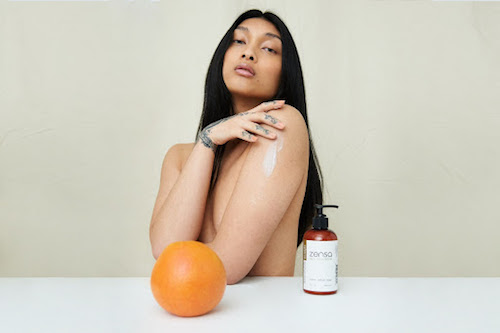
What is Vitamin C?
Vitamin C (or ascorbic acid) is a water-soluble nutrient responsible for collagen production and is essential for boosting the immune system, proper skin barrier function, minimizing infection risk and supporting the body’s wound-healing process. As a powerful antioxidant, Vitamin C also helps neutralize free radicals and protects the skin against environmental toxins such as pollutants and the sun’s damaging UV rays. Vitamin C dissolves in water and is delivered through the body’s tissues. It is not made or stored well in the body, so vitamin C needs to be consumed daily through food or supplements.
While its dietary forms are essential for survival, topical vitamin C is an effective scientifically-backed ingredient. Clinical trials prove that daily topical vitamin C use offers anti-aging and anti-inflammatorybenefits while protecting against long-term sun damage when combined with certain skincare ingredients.
Benefits of Vitamin C For Skin:
- Boosts Collagen & Elastin Production
- Reduces Acne & Skin Inflammation
- Improves Skin Hydration
- Promotes Wound Healing
- Protects Against Sun Damage & Pollutants
- Fights Wrinkles & Fine Lines
- Improves Uneven Skin Tone
- Reduces Scar Appearance
- Brightens Complexion
Vitamin C activates the skin’s fibroblasts to stimulate collagen and elastin production to hydrate the skin and minimize the appearance of fine lines and wrinkles. The nutrient stabilizes any existing collagen reserves already stored in your skin to preserve its plumpness and smooth, firm texture for a more youthful-looking complexion. Vitamin C also supports skin barrier function by increasing the production of barrier lipids (the ‘glue’ that binds your cells together) to reduce transepidermal water loss and keep your skin hydrated.
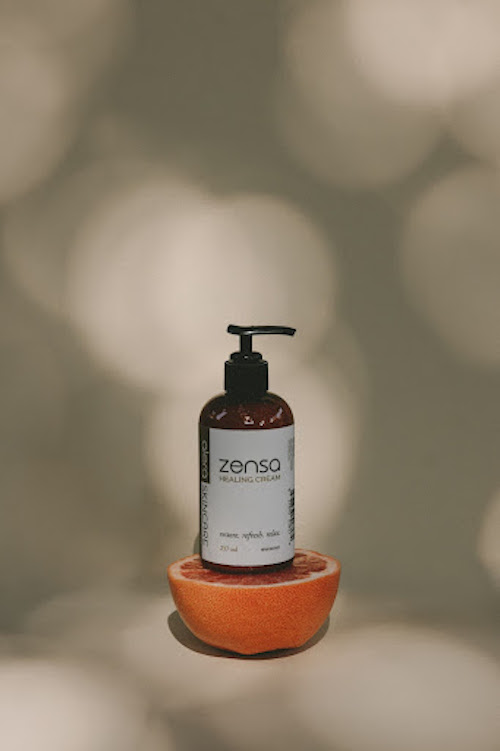
As an antioxidant, vitamin C neutralizes free radicals to reduce inflammation and oxidative stress, which break down healthy cells and damage the moisture barrier – causing skin dryness, irritation or prematurely aged complexion. In response to oxidative stress, the skin triggers cells called melanocytes to produce the pigment melanin, the substance that can cause hyperpigmentation (dark spots, acne scars, etc.). Vitamin C’s antioxidant properties brighten skin and reduce hyperpigmentation by inhibiting tyrosinase, the enzyme that activates the skin melanocytes cells for a more radiant, even-toned complexion.
Vitamin C’s highly acidic nature temporarily breaks down the moisture barrier to cause the skin to self-repair. As a result, Vitamin C boosts cellular regeneration thanks to the nutrient’s collagen-stimulating benefits and sloughs off dead or damaged skin cells to accelerate the skin’s cellular turnover rate. This benefit of vitamin C also supports the wound-healing process and helps minimize scar formation.

Best Ingredients To Pair With Vitamin C:
Here are the best ingredients to mix with vitamin C to hydrate the skin, fight wrinkles, brighten your complexion, fight free radicals and increase sun protection.
- Vitamin E
- Ferulic Acid
- Hyaluronic Acid
- Ceramides
- Peptides
- Sunscreen
- Niacinamide
Vitamin E + Vitamin C: While effective on their own, combining topical vitamin C with vitamin E compounds the nutrients’ individual sun protection benefits and ability to prevent free radical damage. Both antioxidants protect your skin from different types of UV rays, so mixing vitamin C and E serums (or products that include these nutrients) together offers a broader spectrum of UV ray protection, greater free radical neutralization and enhanced prevention against long-term photodamage (sun damage).
Zensa Healing Cream contains several natural ingredients that are rich in vitamins C and/or E including grapefruit essential oil, aloe vera, sunflower seed oil, avocado oil and cucumber extract, among others. These powerful antioxidants work together to reduce irritation, minimize scarring, soothe and hydrate the skin while nourishing the skin barrier to decrease inflammation, manage conditions like eczema and speed up wound healing.
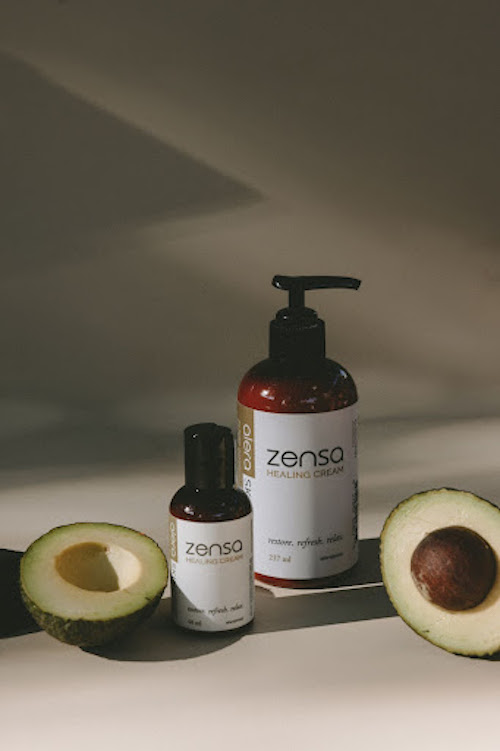
Ferulic Acid + Vitamin C: These two antioxidants amplify each other’s anti-aging benefits and ability to fight free radical damage. Ferulic acid is often combined with vitamin C to make the latter nutrient more shelf-stable (vitamin C degrades quickly, especially when exposed to sunlight). Mixing ferulic acid and vitamin C also increases each other’s efficacy, shielding the skin from harmful UV rays and maximizing protection against sun damage and free radicals.
Vitamin E + Ferulic Acid + Vitamin C: When combined, vitamin E, ferulic acid and vitamin C offer a triple threat to prevent long-term sun damage to your skin. A 2005 study confirmed the enhanced benefits of mixing three antioxidants and found that ferulic acid can offer up to double the photoprotection (ability to protect against sun damage) when combined with vitamin C and E.
Hyaluronic Acid + Vitamin C: These two ingredients enhance each other’s skin-repairing and anti-aging benefits. When mixed together, hyaluronic acid and vitamin C offer a balance of hydration, sun protection and reduced hyperpigmentation for even-toned, radiant and healthy skin. Hyaluronic acid absorbs and retains water to lock moisture into the skin. It can hold up to 1,000 times its weight in water and binds to collagen for a more supple and hydrated complexion. Hyaluronic acid can improve skin elasticity and roughness, making it the perfect complement to vitamin C – which can cause dryness and irritation for individuals with sensitive skin.
Zensa Healing Cream combines hyaluronic acid with vitamin C-rich ingredients, such as grapefruit oil, avocado oil, cucumber extract and aloe vera, to enhance the benefits of these two nutrients and treat several common conditions without overworking the skin.
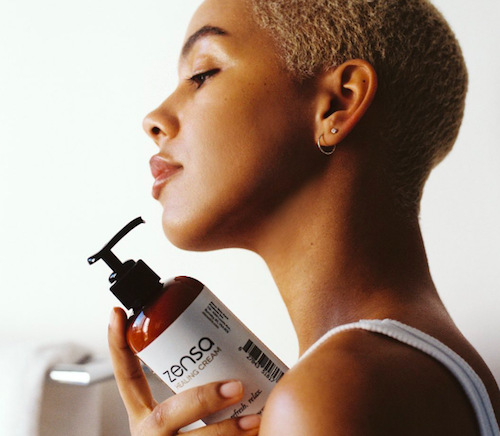
Ceramides + Vitamin C: Ceramides are the long-chain fatty acids that make up the lipid barrier. These lipids hold your cells together to maintain healthy skin barrier function. They lock in moisture to prevent water loss and keep the skin hydrated. Mixing ceramides and vitamin C enhances their overlapping skin benefits. They include boosting skin hydration, reducing the appearance of fine lines and wrinkles, protecting against UV ray damage, encouraging healthy cellular turnover and reducing hyperpigmentation. Simultaneously, ceramides nourish the skin and relieve any dryness or irritation caused by vitamin C.
Peptides + Vitamin C: Peptides, also called polypeptides, are a type of amino acids that make specific proteins in the skin that stimulate collagen production. Like vitamin C, peptides help strengthen the moisture barrier, improve skin elasticity and minimize the appearance of fine lines and wrinkles and reduce inflammation, thanks to their collagen and elastin-boosting benefits. Peptides also contain anti-microbial properties that can help control acne and manage breakouts. Using peptides with vitamin C compounds their mutual anti-aging and collagen-boosting effects.
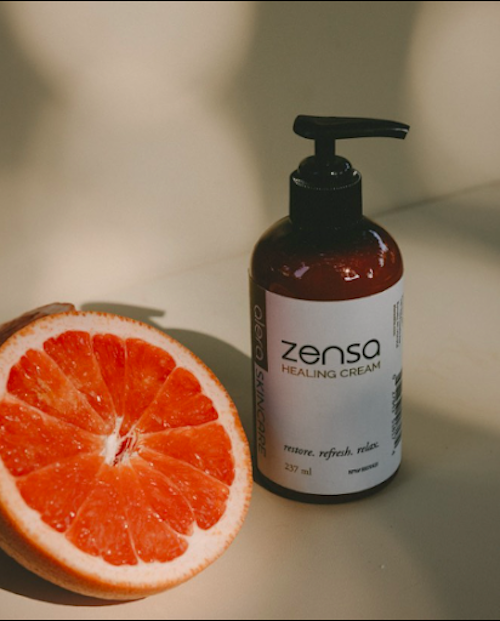
Sunscreen + Vitamin C: Applying sunscreen should become second nature and be the final step during your morning skincare routine. Wearing at least SPF 30 daily provides your skin with the best protection against sun damage. Combining sunscreen with vitamin C amplifies the former’s SPF efficacy. Mixing sunscreen and vitamin C offers protection against a broader spectrum of UV rays to provide a more substantial shield for your skin than one of these ingredients alone. They help prevent free radical damage and the consequences of too much sun exposure, such as hyperpigmentation (dark spots), wrinkles, dryness and generally prematurely aged skin. Apply your vitamin C serum (or toner or lotion) underneath your sunscreen if you plan on using vitamin C during your morning skincare routine. However, if you have particularly sensitive or acne-prone skin, consider incorporating these ingredients at different times of the day. Apply vitamin C at night and SPF in the morning to avoid irritating your skin.
Niacinamide + Vitamin C: Anyone who says that niacinamide (vitamin B3) and vitamin C should not be mixed together is looking at outdated research. Combining niacinamide with vitamin C enhances their individual anti-aging benefits and targets different mechanisms in the skin to reduce hyperpigmentation. Niacinamide helps improve skin barrier function, increases hydration, promotes collagen production and hinders excess sebum production to reduce fine lines, wrinkles and acne. As an antioxidant, niacinamide also offers anti-inflammatory benefits to calm breakouts and help manage conditions like rosacea. It is best to layer niacinamide and vitamin C when incorporating them together in your routine. Find separate products including each ingredient rather than a serum or other skincare item that combines the two.

Worst Ingredients To Pair With Vitamin C:
Pairing certain ingredients with vitamin C can easily irritate the skin. In other cases, mixing can destabilize or cancel out the benefits of the antioxidant. Here are some ingredients to never mix with vitamin C:
- Alpha Hydroxy Acids (AHAs): Lactic Acid, Malic Acid, Glycolic Acid, Citric Acid, Tartaric Acid
- Beta Hydroxy Acids (BHAs): Tropic Acid, Betaine Salicylate, Salix Acid
- Salicylic Acid
- Benzoyl Peroxide
- Retinol
AHAs/BHAs + Vitamin C: AHAs, BHAs and vitamin C are all acidic ingredients. So, pairing an AHA or BHA will destabilize vitamin C. This combination throws off vitamin C’s pH balance and makes the active ingredients nearly useless. Mixing these exfoliants with vitamin C is also highly taxing for your complexion and can cause a damaged skin barrier, dryness, redness or irritation.
Salicylic Acid** + Vitamin C: Salicylic acid and vitamin C can work together to help you achieve a brighter, even-toned and youthful complexion. Best known for its acne-fighting benefits, salicylic acid is an exfoliating ingredient that slows down sebum production to prevent clogged pores, reduces pore size, brightens skin and promotes collagen production. Using salicylic acid with vitamin C separately can enhance each ingredient’s collagen-stimulating and skin anti-aging benefits. However, if you have more sensitive skin, be cautious about layering both these products during either your morning or nighttime routine. Try using one product in the morning (vitamin C) and the other at night (salicylic acid), or use them on different days if you’re worried about irritating your complexion.
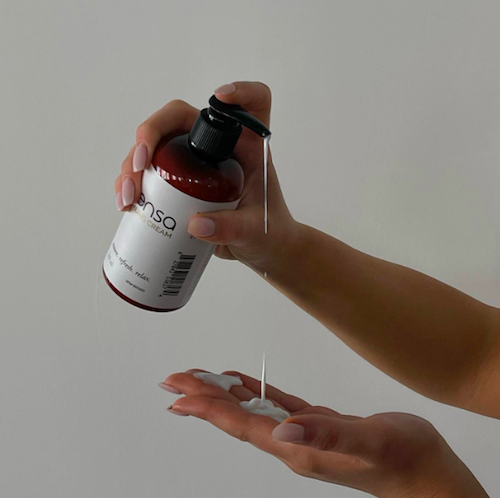
Benzoyl Peroxide + Vitamin C: Benzoyl peroxide can oxidize vitamin C, which renders the pairing useless. This combination cancels out the benefits of the individual ingredients, so make sure to use them separately – either at different times of the day or alternating days throughout the week. If you plan on using benzoyl peroxide to treat mild to moderate acne, consider using vitamin C in the morning and the benzoyl peroxide at night.
Retinol + Vitamin C: Use retinol and vitamin C separately for youthful, even-toned, glowy, clear and renewed skin. Layering retinol and vitamin C together runs the risk of causing skin irritation. Especially if you have sensitive skin, combining retinol and vitamin C result in uncomfortable side effects like redness or dry, itchy skin. Retinol is a derivative of vitamin A known for its collagen-stimulating benefits and accelerating cellular turnover, which helps smooth fine lines and wrinkles, decrease dark spots or hyperpigmentation and improve the overall tone and texture of your skin. It also is an anti-inflammatory agent that clears pores and reduces oil production to help treat acne. Retinol and vitamin C can compound each ingredient’s collagen-boosting effects and promote cellular turnover to neutralize free radicals and shed unhealthy skin cells. Try applying these ingredients at separate times of the day – vitamin C in the morning and retinol at night – for the best results.
Salicylic acid, contrary to popular belief, is not a BHA, but a derivative of benzoic acid. It is still classified as a hydroxy acid but works differently than other AHAs or BHAs. Salicylic acid reduces the thickness of the dermis (middle layer of skin) unlike AHAs or BHAs which thicken the dermis. However, as an exfoliant, it is generally recommended to mix salicylic acid together with vitamin C.

To learn more, here’s everything you should know about using Vitamin C For Skin – including its benefits, the best sources of topical vitamin C and how we incorporate this powerful antioxidant into Zensa Healing Cream to soothe and hydrate your skin.
